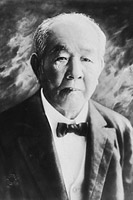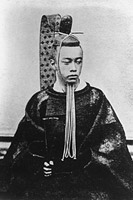Second Paris International Exposition of 1867
International expositions need entertainment too
Column: Eiichi Shibusawa
Eiichi Shibusawa was a top leader in Japanese business circles in the Meiji and Taisho periods. One of the factors contributed to his prominence in Japanese business circles in those days was his participation as an accountant and clerk in the second Paris International Exposition of 1867. He was born in 1840 as the first son of a wealthy farmer in Saitama. Committed to politics, he was an extreme supporter of the doctrine of "Revering the Emperor and Expelling the Barbarians." To realize the doctrine, he planned to usurp Takasaki Castle and set fire to Yokohama—actions ended in vain—and then escaped to Kyoto. After a while, he began to work for the Hitotsubashi Clan of Mito, there demonstrating his abilities in the organization of the clan's famer armies, the implementation of a financial reform, the promotion of industry, and the overhaul of the military system. When Yoshinobu Hitotsubashi assumed the position of shogun, Shibusawa began to work for the shogunate government.
In 1866, a letter was sent from French Emperor Napoleon III to the shogunate in order to request the exhibition of Japanese items at the international exposition held in Paris in 1867 and the attendance of the Japanese sovereign at the event. The shogunate decided to dispatch Akitake Tokugawa, younger brother of Yoshinobu. To guard the 14-year-old proxy in the foreign country, seven clansmen of Mito were selected. Alongside their steadfast loyalty, they were also stubborn supporters of the principle of "Expelling the Barbarians." In this regard, as a leader of the clansmen, Eiichi Shibusawa was added to the group; he had once been an extreme supporter of the doctrine of "Revering the Emperor and Expelling the Barbarians." Also, given his aptitude for arithmetic and moneymaking, it was expected that he would demonstrate his excellent skills as a businessman.
Eiichi Shibusawa demonstrated his skills in accounting and general affairs. He implemented cost cutting measures and sold Japanese items exhibited at the international exposition. Playing his role for the exposition, he stayed in Paris for about one-and-a-half years. During the period,he examined and researched economic law, the reality of joint-stock companies, the mechanism of financial (bank) systems, etc. This subsequently led Japan to the establishment of modern companies, as well as the amendment and reform of its taxation and monetary systems. Also, his examination and research served as the foundation of the establishment of huge financial conglomerates in Japan. Kosei Nikki (Diary of Travel to the West) which provides details of the scale of the exposition, participation in the event by foreign countries, the venue, the situation of Paris at that time, and the movements of the sovereigns of foreign countries. Also, the diary repeatedly describes his admiration for the progress of Western civilization. This indicates that how Shibusawa, who had been an extreme supporter of the principle of "Expelling the Barbarians" just four years before his travel to Europe, changed his outlook after experiencing Western civilization, and how the change led him to his subsequent success.
- References:
Nihon shiseki kyokai sosho (ed).: Shibusawa eiichi taifutsu nikki (Tokyo daigaku shuppankai, 1967)<GB391-66>
Shibusawa, Hanako.: Shibusawa eiichi pari banpaku e (Kokusho kankokai, 1995) <GK128-E113>
Takahashi, Kunitaro.: Hana no pari e shonen shisetsu (Sanshusha, 1979) <D7-52>



